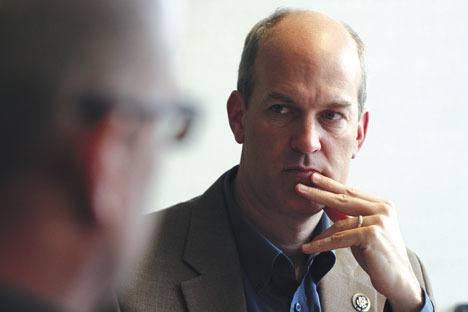LANGLEY — Problems and possibilities.
Congressman Rick Larsen heard plenty of both during an up-and-down visit to Whidbey Island on Wednesday.
The 2nd District Democrat met with community leaders from Clinton to Oak Harbor — and all parts in-between — to discuss jobs and the economy.
Larsen began his day in Langley with a roundtable discussion with city officials and representatives from the Port of South Whidbey, Island Transit and the Langley Chamber of Commerce.
Though the hour-long chat centered on the impacts of the sour economy, Langley Mayor Paul Samuelson didn’t have his hat in his hand at the start of the meeting.
“I want you to know that we’re not going to beat you up for money,” Samuelson quipped.
Despite Langley’s attempts to forge relationships with outside agencies and partners, the mayor said the economy has left the city struggling.
“We think we have some good ideas, and some good things that are going on. I think we have some solutions to some of the issues, and yet we still are stuck in some obvious ways,” Samuelson said.
Other community leaders at the meeting outlined projects that may spur the staggering economy in the years ahead. Port Commissioner Curt Gordon and Dane Anderson, the port’s financial consultant, briefed Larsen on the expansion of the Langley Marina. The project will eventually expand the small-boat harbor by 84 slips, up from the current 34.
Anderson said a year of analysis has shown that most revenue would come from transient moorage.
“It’s almost twice as much as permanent moorage,” Anderson said.
He outlined existing and potential funding sources and support, including county and state money, possible federal funding under a Homeland Security program, and help from local chambers and property owners.
“It is a really significant project, and one that is really teed up and ready to go,” Anderson said.
Port officials touted the location’s deep-water access, and the potential to have moorage space for a first-responder emergency vessel at the marina.
“This is probably one of the biggest projects this part of the world has seen for awhile,” Anderson said.
Port officials said they hoped they could get a letter of support from Larsen as the port seeks federal grants.
Larsen said he could, but only after reviewing the project.
“I have no problem writing a letter of support. It would just be a matter, though, of seeing the application,” Larsen said.
Others talked of endeavors that were still in the talking-about phase. Martha Rose, executive director of Island Transit, led a discussion about creating charging stations for electric cars (and eventually, electric buses), while Langley Councilman Russell Sparkman detailed the efforts to create an economic persona for the Village by the Sea built around the arts, culture and education.
School District Superintendent Fred McCarthy, however, shared sobering statistics on the state of South End schools.
“We’ve been going through some profound demographic and economic shifts,” McCarthy told Larsen.
In 1999, McCarthy said, there were 2,260 students in the district.
“This year, we’ll have 1,475. And we’re heading toward 999 in the year 2020 if our projections are right.
“Our low-income kids have shifted from 20 percent in two years to 50 percent; 50 percent of the kids are on free or reduced lunches,” he added.
McCarthy noted the consolidation and closing of schools in the district, but said the closure of Langley Middle School may lead to a multi-use community facility that could bring additional revenue into the school district.
“We have multiple organizations that want to locate there. This summer, we’re going to start a visioning activity for what that facility could be,” McCarthy said. “We think it could jump-start the economy here, having one major construction project like that that is community oriented.”
Larsen asked why the population was changing on South Whidbey. McCarthy, and others, said the answer was simple: the lack of jobs.
“People want to live here, and they’ve held on as long as they can. There’s no work,” McCarthy said.
“As the small businesses get smaller, an electrical guy might have eight workers; he’s down to two. Or a wallboard guy’s down to one. Construction has just shut down,” he said. “People are moving to get work in other parts of the country, or to live with their families.”
Larsen noted there has been job growth in the economy, adding that the numbers for March — with more than 160,000 new jobs — were the best in three years.
“But those numbers mean really not too much to families who are waking up tomorrow morning and are wondering, will mom and dad have a job tomorrow?” Larsen said.
“My focus is on helping our economy recover and helping small businesses create jobs and grow,” he said.
“The private sector will lead that. There may be parts that can happen only with a little nudge, with a grant here and there. I want to help you all be part of the recovery,” he said.



